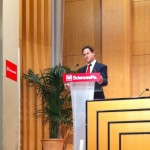‘Journos Abroad’ Nick Clegg Gives Talk at Sciences Po
Britain’s Deputy Prime Minister Nick Clegg popped by the renowned Institute of Political Studies (“Sciences Po” for the French-speaking) in Paris last week for a light-hearted “conversation with students about current events”.
Among the few highlights of the conference was Mr. Clegg’s unexpected response to a British student who, as he addressed the deputy prime-minister, said he was a Lib Dem: “Be careful,” the Liberal Democrats’ leader said, “Hope you get out of here alive!”
Mr. Clegg, who in a few hours would be boarding the Eurostar back to London, took a total of around ten questions about various contemporary and salient issues such as the Lib Dem-Conservative coalition, the events in Syria and – surprise, surprise! – The controversial decision to increase fees. Not a word was mentioned about British-French relations, one of the main issues that was meant to be covered.
Asking all “chaps” and “lads” to speak up, Mr. Clegg replied to audience’s questions in a bit of a hurry. Students were eager to tackle big and contentious issues such as the Conservative’s overwhelming influence on government policy and, of course, the increase of fees.
One student in particular strongly criticized the Lid Dem’s little influence on the Conservatives while in power during the last two years. “Lib Dem voters would’ve never have stood for that,” he said. Mr. Clegg justified his actions by saying that “being in a coalition as the smaller party involves extraordinary compromises”.
“I’m not the Prime Minister,” he said. “I didn’t win! I’d love to implement everything in the Lib Dem manifesto. If you want me to do this, vote for me in larger numbers!” Mr. Clegg even said that the government has ”achieved a hell of a lot” so far and that it “has shown that coalitions do work”. However, he admitted that he would like to see the party he leads “transform from semi-permanent opposition into a party which is […] absolutely in the centre ground of British politics”.
The polemic surrounding the ever present issue of the increase of the fees was one the deputy Prime Minister was, predictably, not able to escape. Out of the few questions students got to ask him, a great majority were to do with this bone of contention.
Shying away from the question, Mr. Clegg said: “We are a poorer country and we need to make really difficult decisions about where to put the money we have left. I would love to wave a magic wand and find a huge pot of gold, but it’s going to take years to wipe the slate clean.”
During the quite intimate conference, the deputy Prime Minister said: “My mom always taught me to look at the person I’m talking to,” as he looked around the room searching for the students who asked him questions. Though some of the issues briefly touched on were serious and pertinent, this 30-minute session was not enough to develop on any of them and Mr. Clegg’s answers were inevitably vague and repetitive.
Sciences Po’s prestigious guest started the debate in immaculate French but didn’t really get to put it to use, since most of the students attending the talk, many of whom were British or of British origin, came to Paris this semester as part of the university’s exchange programme. “I’m sorry, are there any French students here?” Mr. Clegg jokingly said.
Peter Gumbel, Director of Communications at Sciences Po and moderator of the debate, reminded the audience in his brief introduction that the deputy Prime-Minister once was a ski instructor in Austria, setting the tone for the rest of the talk, which was relatively light and humorous all throughout. “Are you the last European in Britain?” Mr. Gumbel asked Mr. Clegg, who speaks five languages, is married to a Spanish woman and has British, Dutch, German and Russian origins.
























